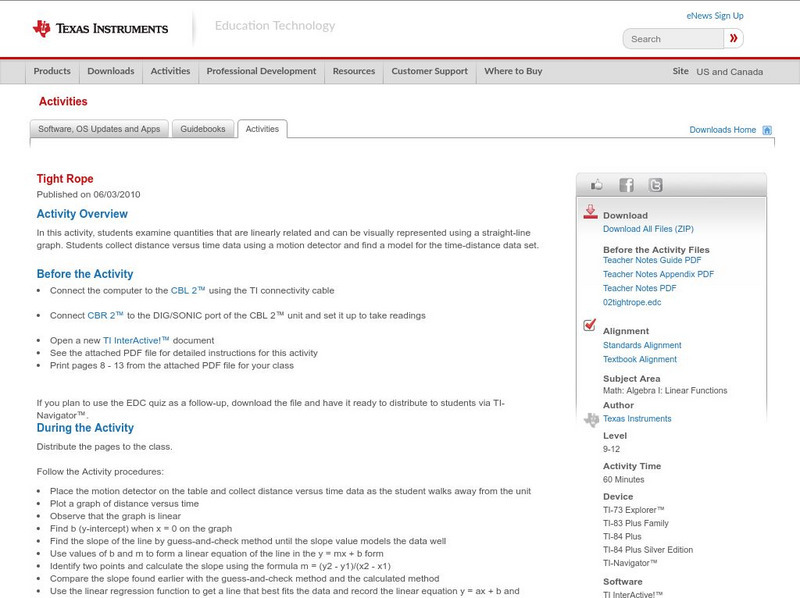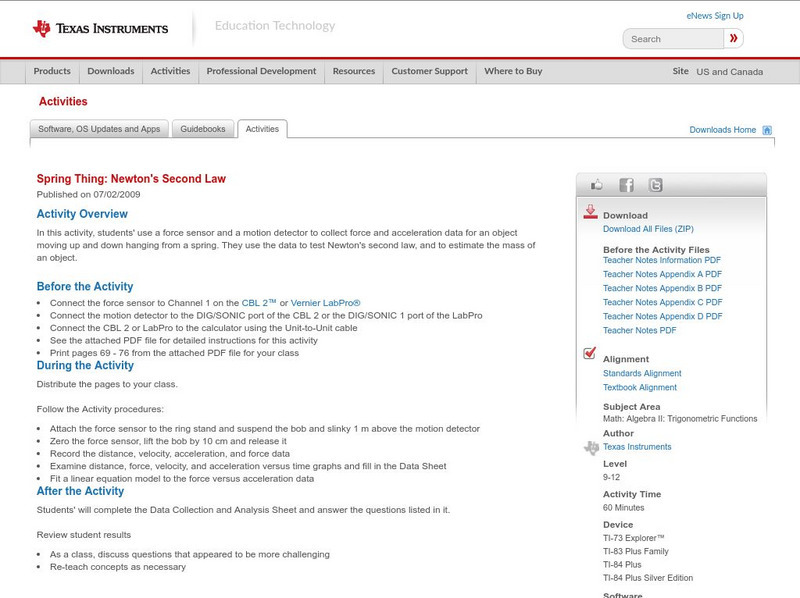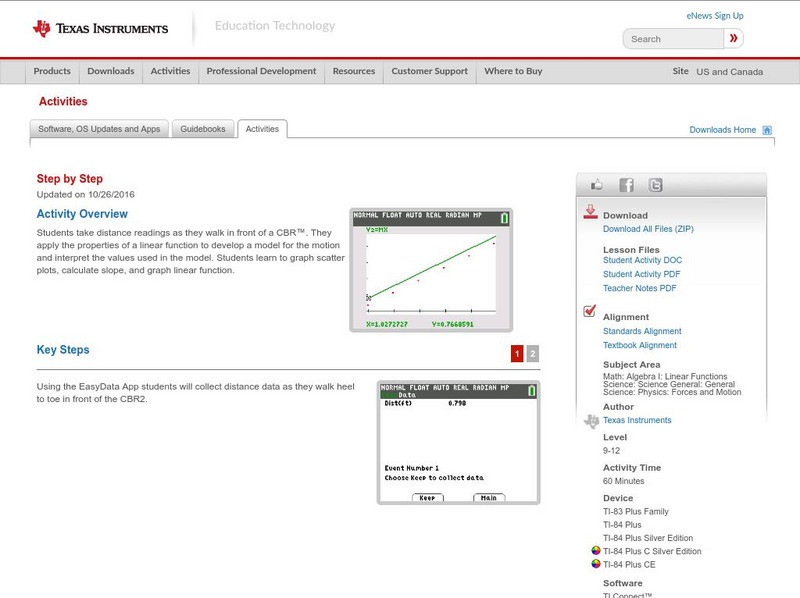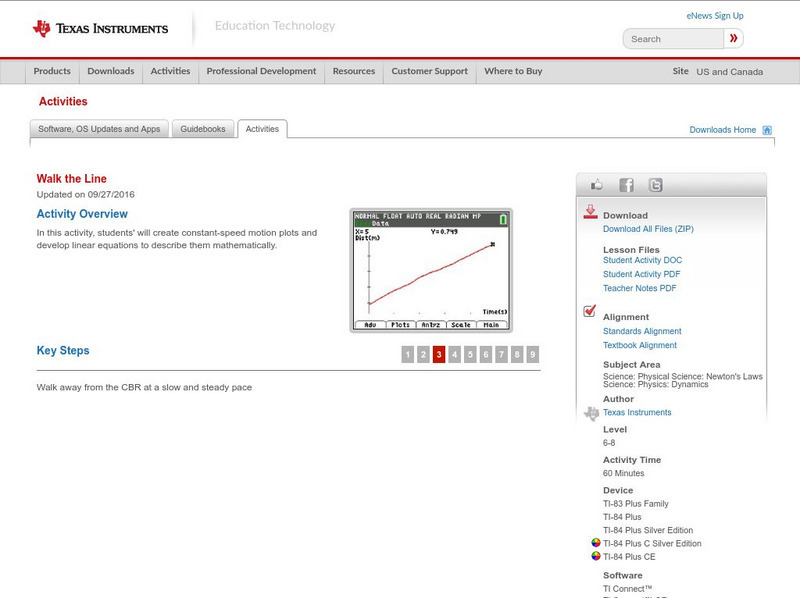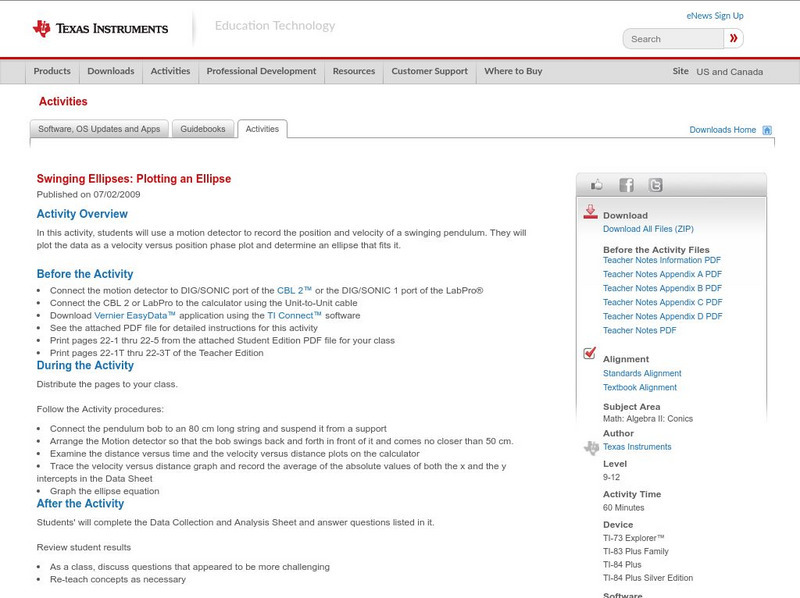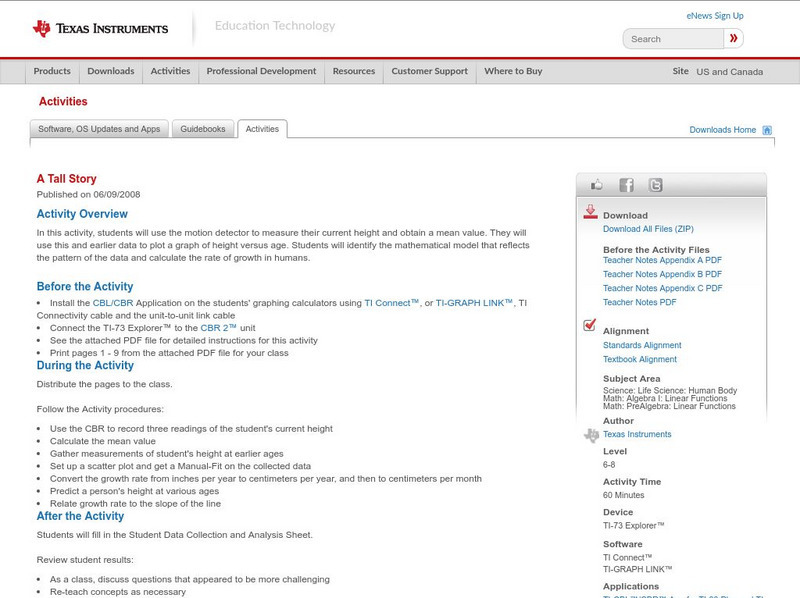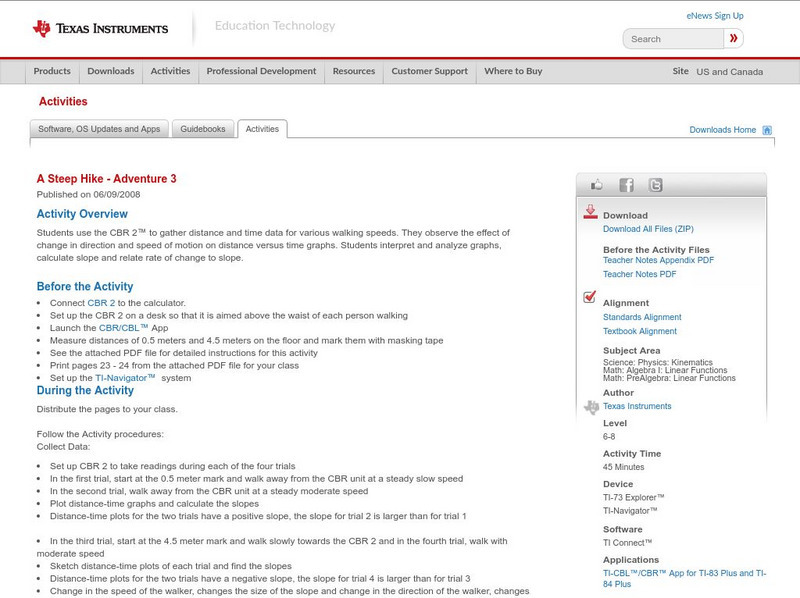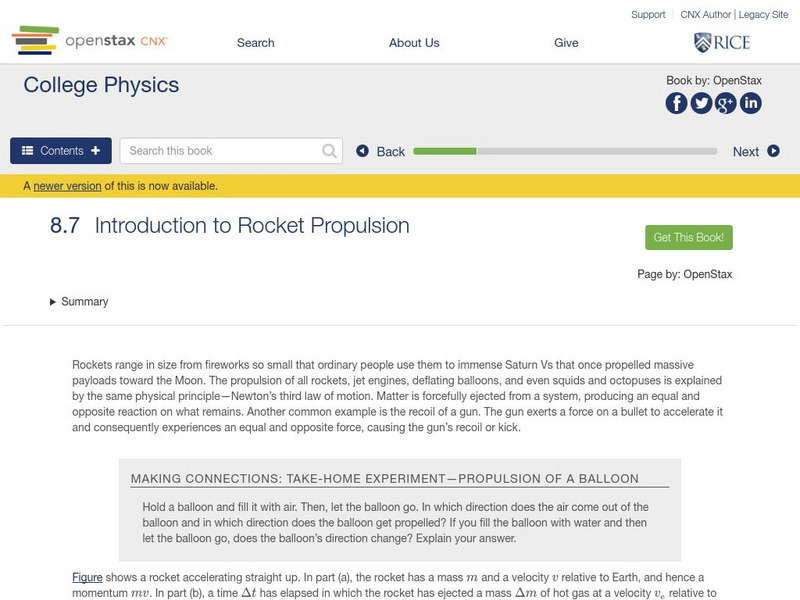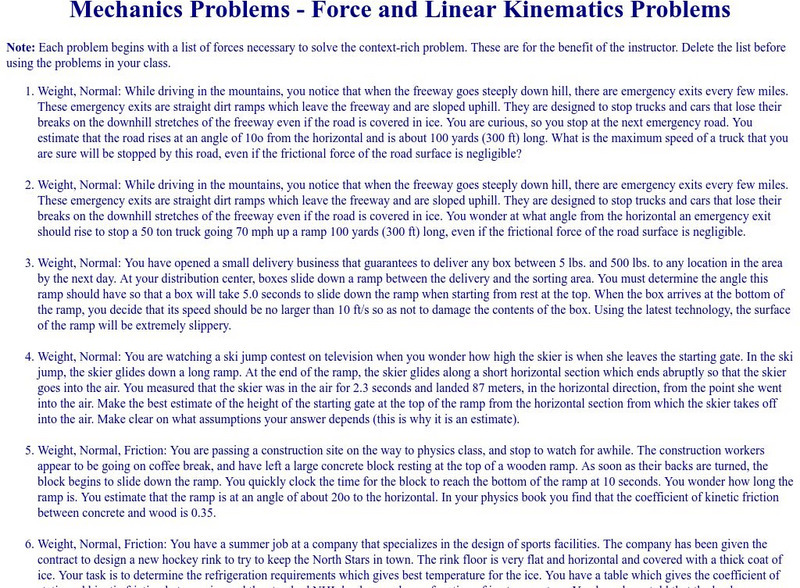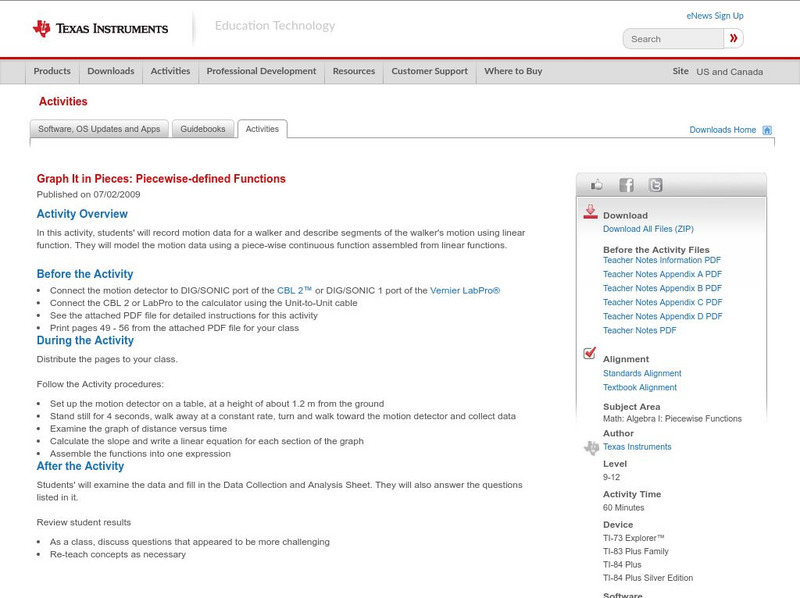Concord Consortium
The Concord Consortium: Molecular Workbench: Bunimovich Stadium
Watch as two particles move through a confined area. The emphasis is on their motion in a straight line until they encounter a barrier and are reflected off in a different direction.
Texas Instruments
Texas Instruments: Tight Rope
In this activity, students examine quantities that are linearly related and can be visually represented using a straight-line graph. Students collect distance versus time data using a motion detector and find a model for the...
Texas Instruments
Texas Instruments: Spring Thing: Newton's Second Law
In this activity, students' use a force sensor and a motion detector to collect force and acceleration data for an object moving up and down hanging from a spring. They use the data to test Newton's second law, and to estimate the mass...
Texas Instruments
Texas Instruments: Step by Step
In this activity, students take distance readings as they walk in front of a CBR. They apply the properties of a linear function to develop a model for the motion and interpret the values used in the model. Students learn to graph...
Texas Instruments
Texas Instruments: Step by Step Activity Data Collection & Analysis
In this activity, students create a situation that produces linear behavior by stepping heel to toe and taking distance readings as each step is taken. Students then apply the properties of a linear function to develop a model for motion.
Texas Instruments
Texas Instruments: Walk the Line
In this activity, students will create constant-speed motion plots and develop linear equations to describe them mathematically.
Texas Instruments
Texas Instruments: Swinging Ellipses: Plotting an Ellipse
In this activity, Students can use a motion detector to record the position and velocity of a swinging pendulum. They will plot the data as a velocity versus position phase plot and determine an ellipse that fits it.
Texas Instruments
Texas Instruments: Stepping to the Greatest Integer: Greatest Integer Function
In this activity, students' will use a motion detector to collect position data showing evenly-spaced jumps in value. They will then model this data using the greatest integer function.
Texas Instruments
Texas Instruments: A Tall Story
In this activity, students can use the motion detector to measure their current height and obtain a mean value. They will use this and earlier data to plot a graph of height versus age. Students will identify the mathematical model that...
Texas Instruments
Texas Instruments: A Steep Hike Adventure 3
Students use the CBR 2 to gather distance and time data for various walking speeds. They observe the effect of change in direction and speed of motion on distance versus time graphs. Students interpret and analyze graphs, calculate slope...
Physics Classroom
The Physics Classroom: Balance and Rotation: Rotational Velocity Interactive
Explore the relationship between the angular and linear velocity for two bugs on a rotating disk.
Physics Aviary
Physics Aviary: Curling Stone Momentum Lab
This lab is designed to have students investigate the nature of a nonlinear collision using curling stones. Students will be able to look at how the velocities before the collision and the mass of the stones affects the results of the...
Technovation
Curiosity Machine: Challenges: Build a Crank Mechanism
In this challenge, students will transfer rotational motion into linear motion by building a simple machine. The site also includes tips, a lesson plan, and a place for students to document their engineering design process.
Physics Aviary
Physics Aviary: Practice Problems: River Crossing Problem Level 3
Students must find out the angle they need to point the boat so that the boat moves directly across the water.
OpenStax
Open Stax: Physics: Angular Acceleration
From a chapter on Rotational Motion and Angular Momentum in a Physics textbook. This section of the chapter discusses uniform and non-uniform circular motion, how to calculate angular acceleration, and the relationship between linear and...
Texas Education Agency
Texas Gateway: Ap Physics: Angular Acceleration
By the end of this section, you will be able to describe uniform circular motion, explain nonuniform circular motion, calculate angular acceleration of an object, and observe the link between linear and angular acceleration.
OpenStax
Open Stax: Physics: Angular Momentum and Its Conservation
From a chapter on Rotational Motion and Angular Momentum in a Physics textbook. This section of the chapter discusses the similarities between angular and linear momentum, how torque and angular momentum are related, and the application...
Massachusetts Institute of Technology
Mit: Open Course Ware: Center of Mass
Students explore center of mass. Some topics examined in the activities are collisions, center of mass motion, and power. The resource consists of video clips, lecture notes, practice problems, and exam questions. Practice problems and...
OpenStax
Open Stax: Introduction to Rocket Propulsion
From a chapter on Linear Momentum and Collisions in a Physics textbook. This section of the chapter discusses Newton's third law of motion in the context of rocket and jet engine propulsion. Students learn how to calculate a rocket's...
University of Minnesota
University of Minnesota: Mechanics Problems: Force and Linear Kinematics Problem
This University of Minnesota site provides a series of contextually rich problems pertaining to force, Newton's second law of motion, and linear kinematics.
Texas Instruments
Texas Instruments: Graph It in Pieces: Piecewise Defined Functions
In this activity, students' will record motion data for a walker and describe segments of the walker's motion using linear function. They will model the motion data using a piece-wise continuous function assembled from linear functions.
Texas Instruments
Texas Instruments: Walk This Walk
In this activity, students use a motion detector to create Distance versus Time graphs. They experiment with various Distance-Time graphs and write mathematical descriptions of motion with constant velocity.
Wolfram Research
Wolfram Science World: Cl Circuit
Shows how simple harmonic motion is used in a circuit comprised of an inductor and a capacitor. Includes detailed formula derivation utilizing calculus.
Khan Academy
Khan Academy: Angular Momentum and Angular Impulse Review
Reference material that reviews how objects rotate and can have linear momentum and angular momentum. Also, learn how the angular momentum of an object can change when torque is applied to an object over time.
Other popular searches
- Physics Linear Motion
- Linear Motion Equations
- Linear Motion Graphs
- Linear Motion Activity
- Activity on Linear Motion
- Linear Motion Word Search
- Patterns in Linear Motion
- Physics, Linear Motion
- Equations of Linear Motion
- Linear Motion Wordsearch

